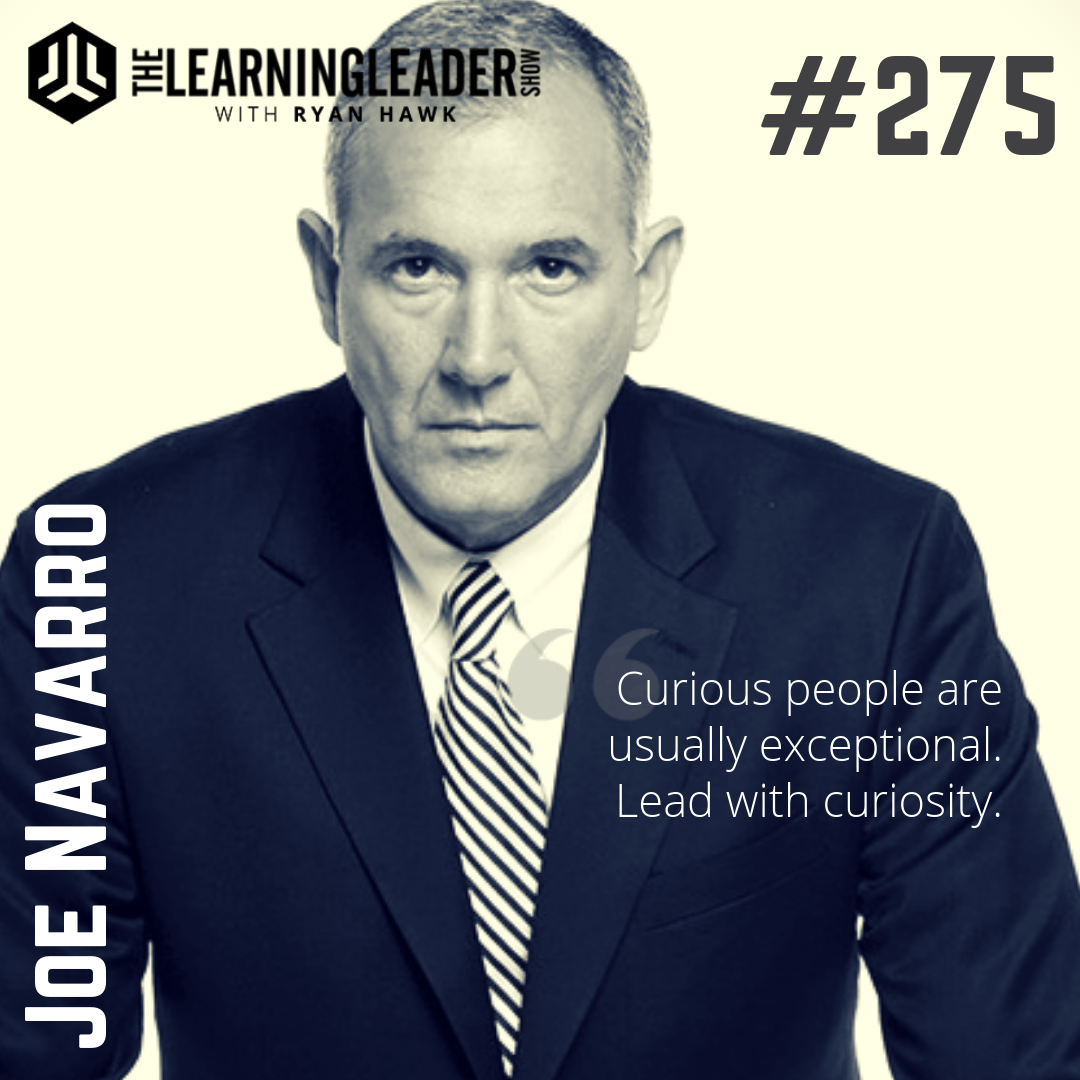Episode #275: Joe Navarro – The World’s #1 Body Language Expert (FBI Special Agent)
Joe Navarro spent 25 years at the FBI, working both as an agent and supervisor in the areas of counterintelligence and counterterrorism. Through his work he was able to study, refine and apply the science of non-verbal communications. His acumen in this field and his success as a spy-catcher, led Joe to begin training FBI agents and the intelligence community.
Today Joe is recognized as one of the world’s foremost authorities on reading non-verbal communications and he is regularly interviewed on programs such as NBC’s Today Show, Fox News, ABC’s Good Morning America, CBS’ Early Show, BBC News, and for publications such as The Washington Post, South China Morning Post and Psychology Today.
Personally sought out by CEOs of a number of major global organizations, Joe provides the same personalized hands-on attention, which made him famous at the FBI and at Harvard Business School where he has lectured annually for the past six years. His books include the international best-seller, What Every Body is Saying, and most recently, The Dictionary of Body Language.
We are hosting a workshop on developing YOUR personal excellence as a leader. For details and availability, go to RyanHawk.me
Check out my new speaker video:
Subscribe on iTunes or Stitcher Radio
The Learning Leader Show
“Curious people are usually exceptional. Lead with curiosity.”
Show Notes:
- Commonalities of sustaining excellence:
- They are exceptional observers
- They understand the needs, wants, desires, fears, and opportunities of themselves and others
- Strong attention to detail
- High levels of self and situational awareness
- “I don’t go where the puck is. I go where it’s going to be.” – Wayne Gretzky
- Some leaders can get mired in the mindless day to day actions. The great ones focus on what’s most important.
- Understanding non-verbals can lead to deep relationships.
- “One of the reasons we study non-verbals is so we can be empathetic.”
- Moving to The U.S. as an 8 year old refugee from Cuba — Joe could not speak the language, so it forced him to pay close attention to the non-verbal communication from his teachers and peers.
- The amazing focus of The Wright Brothers and how that led to their success
- Why the FBI called Joe when he was graduating from BYU
- “In the FBI, I was a paid observer. I detected when something was wrong with the person right in front of me.”
- How do we become what we are capable of?
- “It starts today. What are my limitations right now? Am I observing the things I should be observing?”
- “People are what’s most important. We have to be better observers.”
- “Education is a continuous process. I still see myself as a student.”
- “Curious people are usually exceptional.”
- “Communication is both reflexive and fluid.”
- Do not be cynical or expect people to lie. Treat everyone with a blank slate. Ask questions. Listen. Ask follow up questions…
- “I never assume to have all the facts. I want to hear what you have to say before I make a conclusion.”
- “Our job as leaders is to ask questions, not presume we know all the answers.”
- JFK vs Nixon debate:
- Why did the TV viewers think JFK won while the radio listeners thought Nixon won?
- JFK was tan, good looking, put makeup on, wore a tailored suit. Nixon had a cold, suit didn’t fit as well, didn’t wear makeup, he didn’t look as good as JFK.
- Why did the TV viewers think JFK won while the radio listeners thought Nixon won?
- How we dress is important:
- “Everything is communicating something about us.”
- Winston Churchill — “He always rehearsed what he planned to say in a meeting.”
- Also think, “How can I say this in the fewest number of words?”
- Abraham Lincoln spoke for 2 minutes and 26 seconds for the Gettysburg Address. The speaker before him spoke for 2 hours. We remember people who can effectively be concise.
- “Choose each word carefully.”
- How an introvert can succeed at a networking event?
- “It’s a performance. Lead with curiosity. Ask questions. Get to know one person at a time.”
- Why joining The Learning Leader Circle is a good idea
- Use the “Get To Know You Document“
“Focus on being a better observer.”
Social Media:
- Follow Joe on Twitter: @navarrotells
- Read: What Every BODY Is Saying
- Connect with me on LinkedIn
- Join our Facebook Group: The Learning Leader Community
- To Follow Me on Twitter: @RyanHawk12
More Learning:
Episode 078: Kat Cole – From Hooters Waitress To President of Cinnabon
Episode 216: Jim Collins — How To Go From Good To Great
Episode 200: Keith Hawk & AJ Hawk — Showing Up, Doing The Work, Earning Trust, Helping Others, Winning The Super Bowl, Celebrating #200
Episode 234: Jocko Willink — Why Discipline Equals Freedom


Leave A Comment